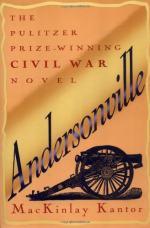The rations issued to us were somewhat better than those of Andersonville, as the meal was finer and better, though it was absurdedly insufficient in quantity, and we received no salt. On several occasions fresh beef was dealt out to us, and each time the excitement created among those who had not tasted fresh meat for weeks and months was wonderful. On the first occasion the meat was simply the heads of the cattle killed for the use of the guards. Several wagon loads of these were brought in and distributed. We broke them up so that every man got a piece of the bone, which was boiled and reboiled, as long as a single bubble of grease would rise to the surface of the water; every vestige of meat was gnawed and scraped from the surface and then the bone was charred until it crumbled, when it was eaten. No one who has not experienced it can imagine the inordinate hunger for animal food of those who had eaten little else than corn bread for so long. Our exhausted bodies were perishing for lack of proper sustenance. Nature indicated fresh beef as the best medium to repair the great damage already done, and our longing for it became beyond description.
CHAPTER LX.
The raiders reappear on the scene—the attempt to assassinate those who were concerned in the execution—A couple of lively fights, in which the raiders are defeated—Holding an election.
Our old antagonists—the Raiders—were present in strong force in Millen. Like ourselves, they had imagined the departure from Andersonville was for exchange, and their relations to the Rebels were such that they were all given a chance to go with the first squads. A number had been allowed to go with the sailors on the Special Naval Exchange from Savannah, in the place of sailors and marines who had died. On the way to Charleston a fight had taken place between them and the real sailors, during which one of their number—a curly-headed Irishman named Dailey, who was in such high favor with the Rebels that he was given the place of driving the ration wagon that came in the North Side at Andersonville —was killed, and thrown under the wheels of the moving train, which passed over him.
After things began to settle into shape at Millen, they seemed to believe that they were in such ascendancy as to numbers and organization that they could put into execution their schemes of vengeance against those of us who had been active participants in the execution of their confederates at Andersonville.
After some little preliminaries they settled upon Corporal “Wat” Payne, of my company, as their first victim. The reader will remember Payne as one of the two Corporals who pulled the trigger to the scaffold at the time of the execution.




